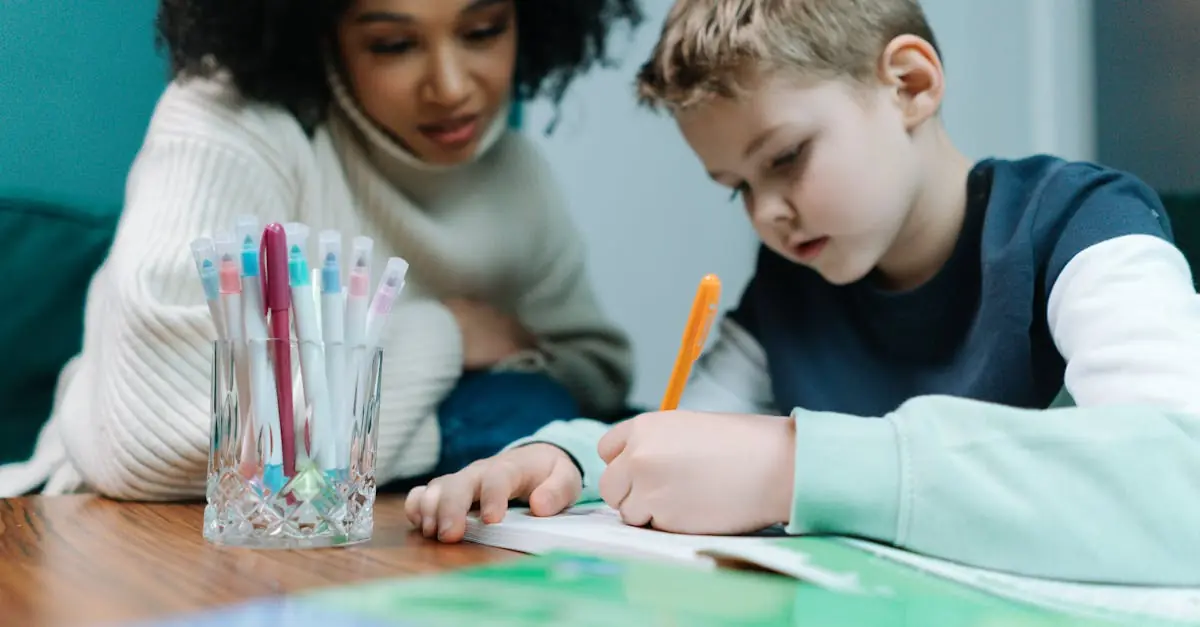Literacy development isn’t just about cracking open a book and pretending to understand Shakespeare. It’s the magical journey of acquiring the skills that transform scribbles into sentences and letters into literature. Imagine a world where children can decode the mysteries of the written word and express their wildest thoughts without resorting to interpretive dance.
Table of Contents
ToggleOverview of Literacy Development
Literacy development encompasses the essential skills required for reading and writing. Children progress through various stages, starting with letter recognition and moving towards writing sentences and paragraphs. This developmental journey plays a crucial role in their ability to communicate thoughts effectively.
Acquiring phonemic awareness forms a foundation for understanding that letters correlate with sounds. Vocabulary expansion enhances comprehension, allowing children to grasp the meanings of words within context. Decoding skills enable them to read unfamiliar words, paving the way for increased reading fluency.
Comprehension strategies help learners extract meaning from texts. Engaging with diverse literature exposes children to different writing styles and viewpoints. Consequently, they gain the ability to analyze and evaluate information critically.
Technology affects literacy development significantly. Digital tools provide interactive opportunities for reading and writing, making the learning process more engaging. Furthermore, emerging literacy skills can stem from multimedia resources, which support varied learning styles.
Parental involvement contributes greatly to a child’s literacy journey. Reading together fosters a love for books while enhancing vocabulary acquisition. Regular discussions about stories promote deeper understanding and critical thinking.
Structured literacy programs effectively address the needs of diverse students. Teachers use systematic approaches to teach phonemic awareness, phonics, vocabulary, comprehension, and writing.
Social interactions also influence literacy development. Engaging in conversations and sharing ideas strengthens a child’s ability to articulate thoughts and respond to feedback. Thus, literacy development is not merely a solitary activity but thrives in a collaborative environment.
Importance of Reading and Writing Skills
Reading and writing skills form the foundation of communication. Developing these skills leads to effective self-expression and enhanced understanding of the world.
Building Foundations for Literacy
Foundational skills like phonemic awareness support early reading. Children recognize sounds that form words, enabling them to decode text. Vocabulary growth occurs through diverse readings, exposing them to various contexts. Sentence and paragraph construction builds complexity in their writing. Engaging in structured literacy programs targets individual learning needs. Interactive experiences, such as shared reading, promote a love for literature. Skills learned at this stage equip children with the tools to articulate thoughts and ideas.
Cognitive Benefits of Literacy Development
Cognitive development flourishes with literacy engagement. Critical thinking skills emerge as children analyze plots and characters. Problem-solving abilities improve through understanding narratives and themes. Retaining information becomes easier once they connect ideas within texts. Literacy fosters creativity, encouraging imaginative thinking in storytelling. Additionally, comprehension skills promote the ability to synthesize information across various subjects. Overall, reading and writing become key drivers of educational success and lifelong learning.
Key Components of Literacy Development
Literacy development encompasses a range of essential skills. These components lay the groundwork for effective reading and writing.
Phonemic Awareness
Phonemic awareness refers to the ability to recognize and manipulate individual sounds in spoken words. This skill forms the basis for understanding the relationship between sounds and letters. Children who excel in phonemic awareness demonstrate better reading proficiency due to improved decoding skills. Activities like rhyming games and sound matching enhance phonemic awareness, allowing children to develop a stronger foundation for reading. Mastery in this area often leads to greater ease in understanding written language.
Vocabulary Acquisition
Vocabulary acquisition involves expanding knowledge of words and their meanings. A rich vocabulary enhances a child’s ability to comprehend texts and express ideas. Exposure to a variety of reading materials significantly contributes to vocabulary development. Listening to stories and engaging in conversations also foster vocabulary growth. It’s vital for children to encounter words in context, as this helps solidify their understanding. A developed vocabulary supports overall literacy skills and prepares children for academic success.
Reading Comprehension Strategies
Reading comprehension strategies focus on improving understanding of texts. Effective strategies include summarizing, questioning, and predicting content. Encouraging children to think critically while reading promotes deeper engagement with the material. Additionally, discussions about the story can enhance comprehension and retention of information. Diverse literature serves as a rich resource for developing analytical skills. Children who practice these strategies often find it easier to interpret and analyze various forms of text.
Techniques to Promote Literacy
Promoting literacy requires targeted approaches to develop reading and writing skills effectively. Engaging methods can significantly enhance children’s abilities to communicate.
Interactive Reading Practices
Interactive reading practices foster deeper comprehension and engagement. Parents and educators can use dialogic reading techniques, encouraging children to discuss the story as it unfolds. Asking open-ended questions enhances critical thinking and prediction skills. Incorporating role-playing activities encourages children to act out scenes, reinforcing their understanding of the text. Utilizing diverse book selections exposes children to varied vocabulary, enriching their language skills. Reading aloud together promotes fluency and expression, making the experience enjoyable and educational.
Writing Interventions
Writing interventions target specific areas to improve children’s writing capabilities. Teaching structured writing techniques helps them organize their thoughts effectively. Guided writing sessions allow educators to provide immediate feedback, helping students refine their skills. Implementing peer review sessions encourages collaboration and constructive criticism. Utilizing graphic organizers aids in visualizing ideas, assisting in sentence and paragraph construction. Regular writing prompts stimulate creativity and self-expression, making writing a dynamic and interactive process.
Challenges in Literacy Development
Literacy development faces various challenges that can hinder progress.
Identifying Learning Difficulties
Recognizing learning difficulties remains vital for effective literacy development. Many children struggle with reading and writing due to specific learning disabilities like dyslexia. Identifying these challenges early allows educators to implement individualized strategies. Teachers can conduct assessments to pinpoint areas of need. Observations during reading sessions highlight difficulties in decoding or comprehension. Collaboration with specialists provides additional insights. Engaging parents in discussions about their child’s progress fosters a supportive environment at home. Addressing these challenges promptly can significantly improve literacy skills.
Overcoming Barriers to Literacy
Overcoming barriers to literacy involves a multifaceted approach. Access to resources plays a crucial role; schools must provide diverse reading materials and technologies. Developing a literacy-rich environment helps foster engagement. Teachers should employ varied instructional techniques to accommodate different learning styles. For instance, combining visual aids with auditory learning can boost comprehension. Regular feedback from peers and educators reinforces development. Creating partnerships with community organizations can also enhance support. Ultimately, addressing these barriers ensures all learners progress in their literacy journey.
Literacy development is a vital journey that shapes a child’s ability to communicate effectively. By mastering reading and writing skills, children unlock the power to express their thoughts and understand the world around them. The emphasis on foundational skills like phonemic awareness and vocabulary expansion creates a strong basis for lifelong learning.
Engaging children through diverse reading materials and interactive experiences fosters a love for literature. Parents and educators play a crucial role in this process, providing support and encouragement. Addressing challenges early ensures that every child has the opportunity to thrive in their literacy journey. Ultimately, nurturing these skills not only enhances communication but also cultivates critical thinking and creativity essential for success in various aspects of life.






